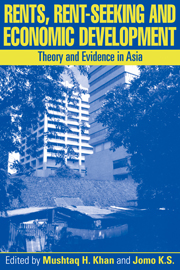Book contents
- Frontmatter
- Contents
- List of Figures
- List of Tables
- List of Contributors
- Acknowledgements
- List of Abbreviations
- Introduction
- 1 Rents, Efficiency and Growth
- 2 Rent-seeking as Process
- 3 Rent-seeking and Economic Development in Thailand
- 4 Thailand's Old Bureaucratic Polity and Its New Semi-democracy
- 5 Obstructive Corruption: The Politics of Privilege in the Philippines
- 6 Funny Money: Fiscal Policy, Rent-seeking and Economic Performance in Indonesia
- 7 The Malaysian Development Dilemma
- 8 Financial Sector Rents in Malaysia
- Index
5 - Obstructive Corruption: The Politics of Privilege in the Philippines
Published online by Cambridge University Press: 05 March 2012
- Frontmatter
- Contents
- List of Figures
- List of Tables
- List of Contributors
- Acknowledgements
- List of Abbreviations
- Introduction
- 1 Rents, Efficiency and Growth
- 2 Rent-seeking as Process
- 3 Rent-seeking and Economic Development in Thailand
- 4 Thailand's Old Bureaucratic Polity and Its New Semi-democracy
- 5 Obstructive Corruption: The Politics of Privilege in the Philippines
- 6 Funny Money: Fiscal Policy, Rent-seeking and Economic Performance in Indonesia
- 7 The Malaysian Development Dilemma
- 8 Financial Sector Rents in Malaysia
- Index
Summary
Throughout the late 1980s and early to mid-1990s, an enduring puzzle for many analysts of Thailand, Malaysia and Indonesia was the seemingly compatible coexistence of rampant corruption and rapid economic growth. Now, amid the crisis of the late 1990s, much debate centres around the degree to which corruption is actually to blame for the steep plunge of these same economies. As a country with longstanding experience combining corruption with generally less-than-stellar economic performance, the Philippines offers valuable insights into the patterns of behaviour now commonly associated with its neighbours' malaise.
At the outset, it is important to note that the Philippines has often been out of step with regional economic trends. Between 1980 and 1992, while its Southeast Asian neighbours were moving towards new strategies and subsequendy reaping unprecedented economic gains, the Philippines' real per capita income declined by 7.2 per cent. Even when Philippine aggregate annual growth rates climbed to 5–7 per cent in the mid-1990s, the country's overall economic performance remained comparatively modest and the gains short-lived. At decade's end, the Philippines has enjoyed a relative buoyancy amid the crises that surround it: while many neighbours suffered severe economic downturns, the Philippines registered a barely positive annual growth rate (of 0.1 per cent) for 1998. The country's earlier adversity has in many ways offered a certain short-term advantage, as the very lack of extended periods of high growth inhibited the dramatic surges in foreign indebtedness – and property and stock market values – that were found elsewhere in the region (Hutchcroft 1999a).
- Type
- Chapter
- Information
- Rents, Rent-Seeking and Economic DevelopmentTheory and Evidence in Asia, pp. 207 - 247Publisher: Cambridge University PressPrint publication year: 2000
- 17
- Cited by

